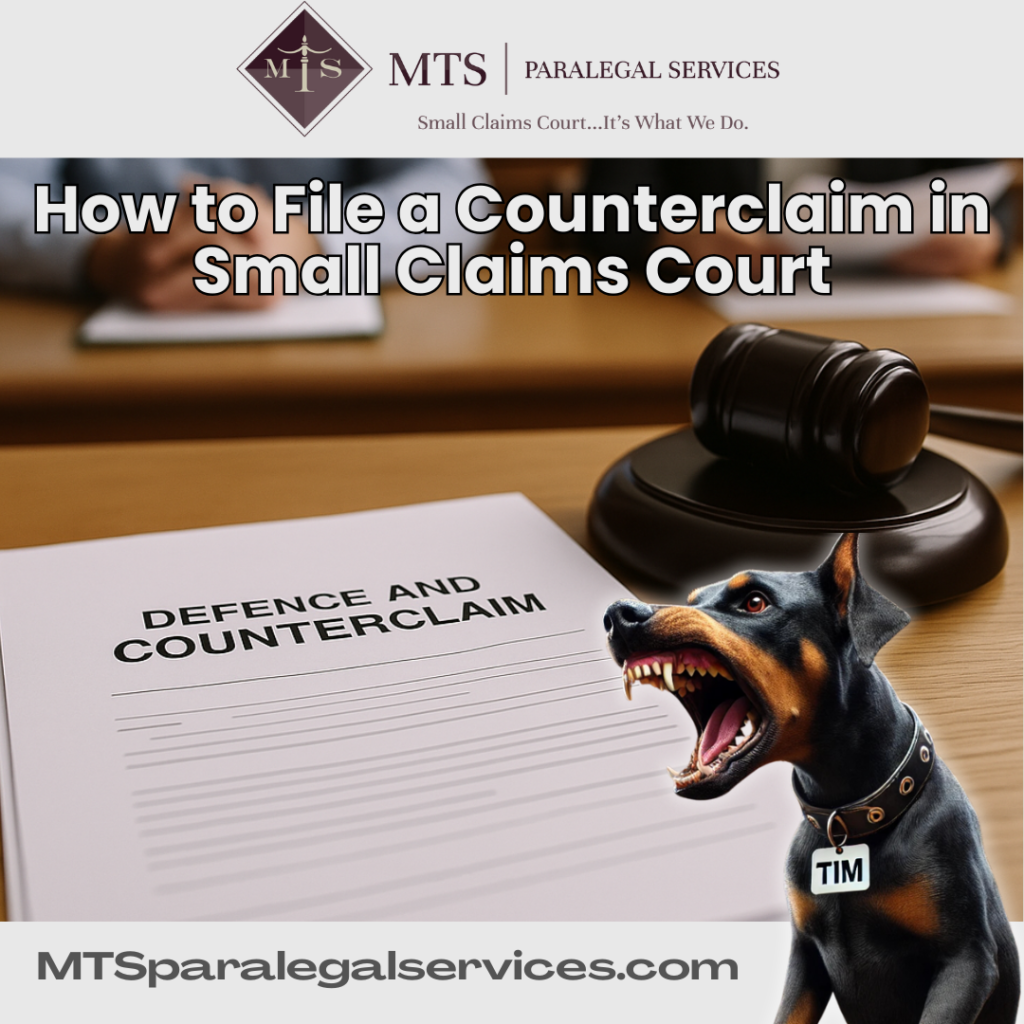
How to File a Counterclaim in Small Claims Court
In Ontario, Small Claims Court offers a streamlined and cost-effective venue for resolving legal disputes—whether between individuals, landlords and tenants, or businesses—without the complexity and expense of higher courts. As of October 1, 2025, the monetary jurisdiction of Ontario’s Small Claims Court has increased from $35,000 to $50,000, significantly expanding the range of civil matters that can be addressed through this forum. Read more about this important change here. While plaintiffs initiate claims, defendants are not without recourse. If you’ve been named in a claim and believe you are owed money or have your own legal grievances tied to the dispute, you may file a counterclaim. This allows the defendant to pursue a legal remedy against the plaintiff within the same proceeding, ultimately promoting efficiency and procedural fairness.
Step-by-Step Process for Filing a Counterclaim
Understand the Basis of Your Counterclaim
Before initiating a counterclaim in Small Claims Court, it is imperative that the defendant has a valid legal foundation for doing so. Common grounds for counterclaims include disputes over amounts allegedly owed, breach of contract, negligence, or damage to property caused by the plaintiff. A counterclaim is not a mere denial of the plaintiff’s allegations—it is a separate legal claim brought within the same proceeding. The defendant, now acting as a counterclaimant, bears the burden of proof and must present credible evidence demonstrating that the plaintiff is legally responsible for the harm or financial loss alleged.
Determine the Monetary Limit
As of October 1, 2025, the monetary jurisdiction of Ontario’s Small Claims Court has increased to $50,000, expanding access to affordable legal remedies for higher-value civil disputes. This limit applies equally to original claims and counterclaims. Any counterclaim filed must fall within this monetary threshold. For claimants outside Ontario, monetary limits vary by province, so it is important to confirm the applicable cap in your jurisdiction.
3. Prepare Your Documents
The next step is to gather all relevant documents, including contracts, receipts, photographs, and any communication that supports your counterclaim. These documents are vital for proving the legitimacy of your counterclaim in court. You may also wish to compile witness statements, as they can strengthen your case.
4. Fill Out the Required Forms
To file a counterclaim, you need to complete the appropriate forms. In most provinces, the form is titled the “Defence and Counterclaim.” This document must be submitted to the court where the original claim was filed. The counterclaim form typically asks for your version of events, the legal basis of your claim, and the amount you are seeking in damages.
5. File Your Counterclaim
Once you have completed the necessary paperwork, submit the forms to the Small Claims Court where the original case was filed. Keep in mind that there may be a filing fee, which varies by province. Once the court accepts your counterclaim, the plaintiff will be notified, and a court date will be set.
6. Attend the Hearing
At the hearing, both parties—plaintiff and defendant—will present their arguments, submit their evidence, and call witnesses. If you have filed a counterclaim, it will be heard alongside the plaintiff’s original claim. It is essential to be well-prepared to defend your case, present the necessary documentation, and respond to the plaintiff’s arguments.
7. Court Decision
Once both parties have presented their cases, the judge will make a decision. If the judge rules in your favour, the court will issue a judgment, and you may be awarded damages. The amount of damages will depend on the merits of your case and the evidence presented.
Why Seek Professional Assistance?
While Small Claims Court is designed to be accessible for individuals without legal representation, navigating the process can still be challenging. Filing a counterclaim involves specific legal requirements, documentation, and strategies to ensure your case is presented in the best possible light. Tim at MTS can provide the support you need to streamline the process, ensuring that all procedural rules are followed and that you present a strong, convincing case.
If you are considering filing a counterclaim in Small Claims Court, it is highly recommended that you seek professional assistance to ensure your rights are protected and that your counterclaim is filed properly.
For expert guidance, call Tim at MTS Paralegal Services at (226) 444-4882. Tim is experienced in Small Claims Court matters and can help you navigate the process from start to finish.
This content does not constitute legal advice. For up-to-date guidance or legal advice specific to your situation, please contact MTS Paralegal Services Professional Corporation or call (226) 444-4882.
